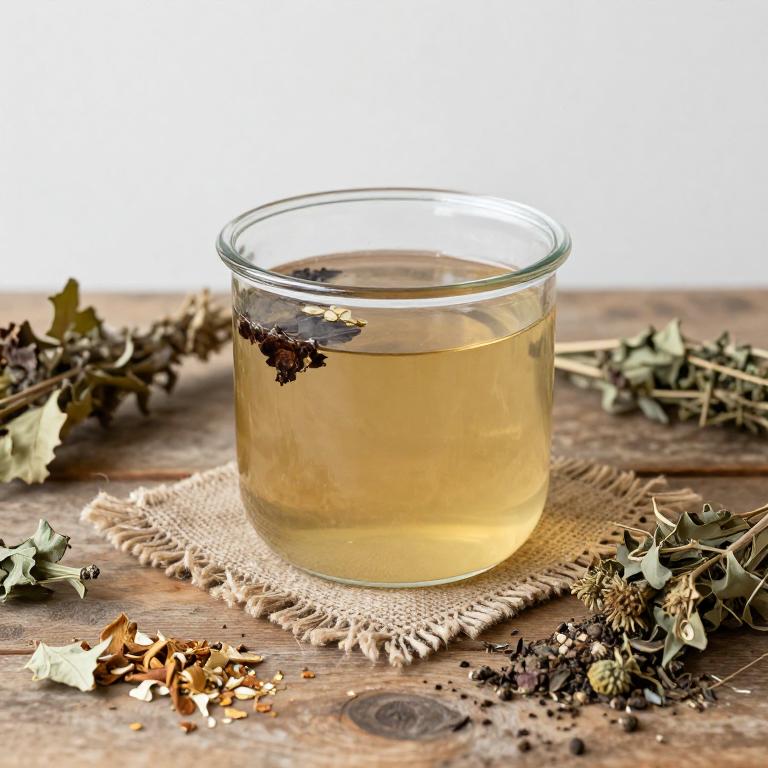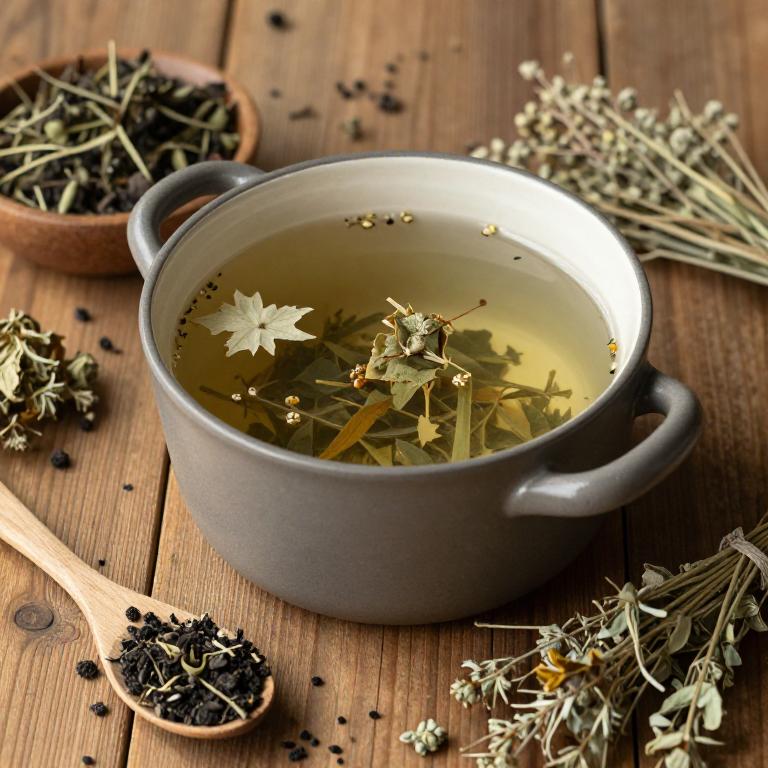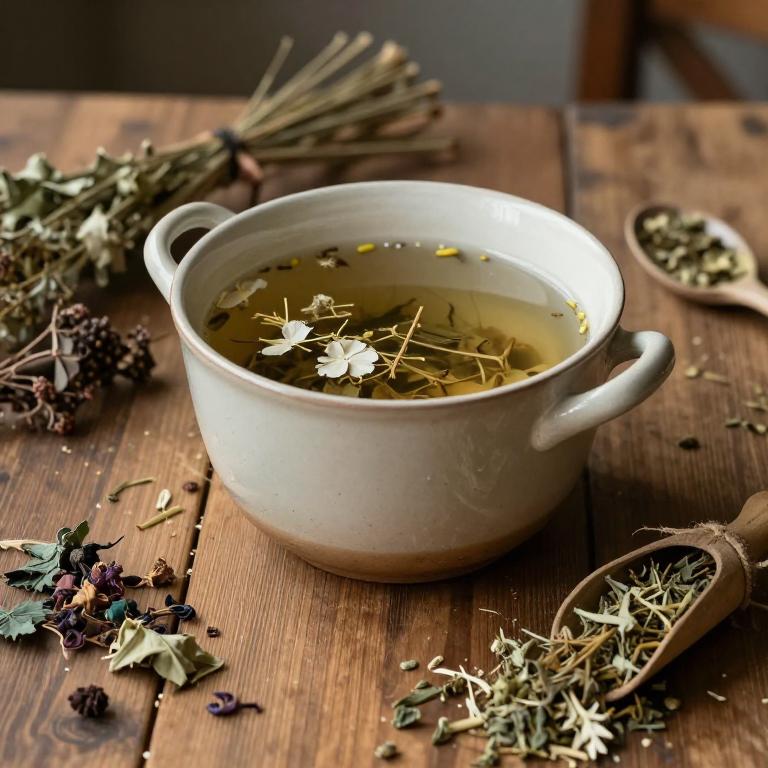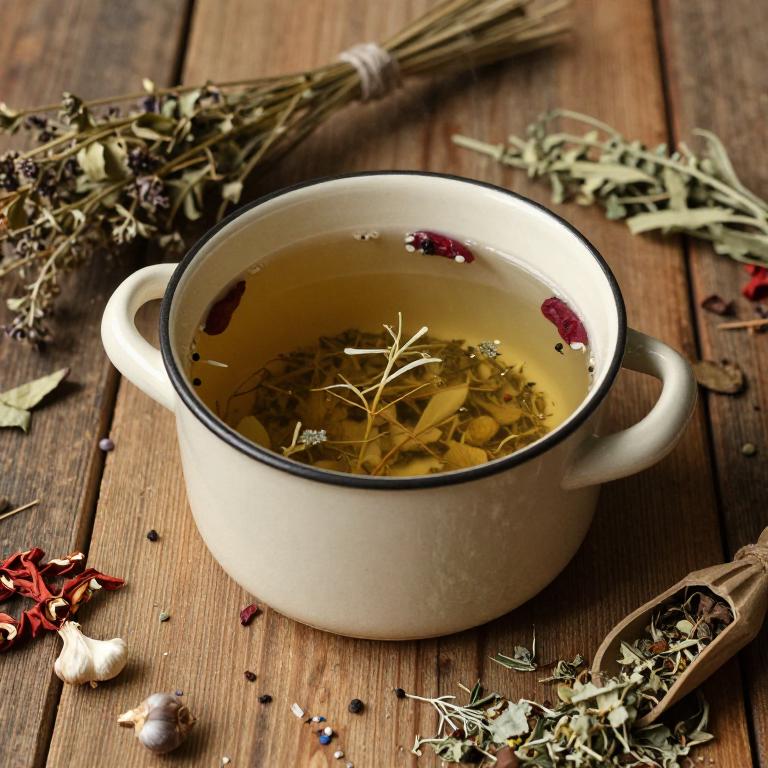10 Best Herbal Decoctions For Peptic Ulcers

Herbal decoctions have been traditionally used to treat peptic ulcers by promoting healing and reducing inflammation in the stomach lining.
Common herbs such as licorice root, ginger, and chamomile are often included in these formulations due to their soothing and anti-inflammatory properties. These decoctions work by enhancing the protective mucus layer, inhibiting the growth of harmful bacteria like Helicobacter pylori, and reducing gastric acid secretion. While they can be a complementary therapy, they should not replace conventional medical treatment without professional guidance.
It is important to consult a healthcare provider before using herbal decoctions to ensure safety and effectiveness.
Table of Contents
- 1. Ginger (Zingiber officinale)
- 2. Licorice (Glycyrrhiza glabra)
- 3. Peppermint (Mentha piperita)
- 4. Turmeric (Curcuma longa)
- 5. Thistle (Silybum marianum)
- 6. Cumin (Cuminum cyminum)
- 7. Common grape (Vitis vinifera)
- 8. Marshmallow (Althaea officinalis)
- 9. Stinging nettle (Urtica dioica)
- 10. Chamomile (Matricaria chamomilla)
1. Ginger (Zingiber officinale)

Zingiber officinale, commonly known as ginger, has been traditionally used in herbal medicine for its potential therapeutic effects on peptic ulcers.
Ginger contains bioactive compounds such as gingerol and shogaol, which exhibit anti-inflammatory and antioxidant properties that may aid in the healing of gastric ulcers. Herbal decoctions made from fresh or dried ginger root are often prepared by boiling the root in water to extract these beneficial compounds. Studies suggest that ginger may help reduce stomach acid secretion and protect the gastric mucosa, thereby supporting ulcer healing.
However, while preliminary research shows promise, more clinical trials are needed to fully establish its efficacy and safety in treating peptic ulcers.
2. Licorice (Glycyrrhiza glabra)

Glycyrrhiza glabra, commonly known as licorice root, has been traditionally used in herbal medicine for its potential therapeutic effects on peptic ulcers.
The decoctions made from this plant contain compounds such as glycyrrhizin, which exhibit anti-inflammatory and mucoprotective properties that may help in the healing of gastric ulcers. Studies suggest that licorice root decoctions can reduce gastric acid secretion and enhance the protective mucus layer in the stomach lining. However, long-term use of licorice root may lead to side effects such as hypertension due to its mineralocorticoid-like effects.
As a result, it is often recommended to use licorice root decoctions under the guidance of a qualified healthcare provider for the management of peptic ulcers.
3. Peppermint (Mentha piperita)

Mentha piperita, commonly known as peppermint, has been traditionally used in herbal medicine for its soothing properties, and its decoctions have shown potential in the treatment of peptic ulcers.
The essential oils and compounds found in peppermint, such as menthol and rosmarinic acid, may help reduce gastric acid secretion and protect the stomach lining from irritation. Studies suggest that peppermint decoctions can alleviate symptoms associated with peptic ulcers by promoting digestive comfort and reducing inflammation. However, while some research supports its use, more clinical trials are needed to fully establish its efficacy and safety in treating ulcers.
As a complementary therapy, peppermint decoctions may be beneficial when used alongside conventional treatments under medical supervision.
4. Turmeric (Curcuma longa)

Curcuma longa, commonly known as turmeric, has been traditionally used in herbal medicine for its potential therapeutic effects on peptic ulcers.
The active compound in curcuma longa, curcumin, possesses anti-inflammatory, antimicrobial, and antioxidant properties that may aid in the healing of gastric ulcers. Studies suggest that curcumin can help reduce the production of stomach acid and protect the gastric mucosa from damage. Herbal decoctions made from curcuma longa are often prepared by boiling the rhizomes in water, allowing the beneficial compounds to be extracted.
While curcumin shows promise in the treatment of peptic ulcers, it is typically used as a complementary therapy alongside conventional medical treatments.
5. Thistle (Silybum marianum)

Silybum marianum, also known as milk thistle, has been traditionally used for its potential therapeutic effects on digestive health.
Herbal decoctions made from the seeds of Silybum marianum are often prepared by boiling the dried seeds in water to extract their active compounds, particularly silymarin. These decoctions are believed to support liver function and may aid in the healing of peptic ulcers by reducing inflammation and promoting tissue repair. Research suggests that silymarin exhibits antioxidant and anti-inflammatory properties that could benefit the gastrointestinal tract.
However, while some studies show promise, more clinical trials are needed to fully establish its efficacy in treating peptic ulcers.
6. Cumin (Cuminum cyminum)

Cuminum cyminum, commonly known as cumin, has been traditionally used in herbal medicine for its potential therapeutic effects on peptic ulcers.
The essential oils and bioactive compounds in cumin, such as cuminaldehyde and thymol, exhibit anti-inflammatory and antimicrobial properties that may help in reducing stomach acid and protecting the gastric lining. Herbal decoctions made from cumin seeds are often prepared by boiling the seeds in water and consuming the resulting infusion, which is believed to soothe the digestive tract. Studies suggest that cumin may inhibit the growth of Helicobacter pylori, a common cause of peptic ulcers, thereby supporting ulcer healing.
While more research is needed, cumin-based decoctions are considered a complementary approach in managing symptoms and promoting gastrointestinal health.
7. Common grape (Vitis vinifera)

Vitis vinifera, commonly known as the grapevine, has been traditionally used in herbal medicine for its potential therapeutic effects on peptic ulcers.
Herbal decoctions made from the leaves and fruits of Vitis vinifera are believed to possess anti-inflammatory and antioxidant properties that may help in reducing gastric acid secretion and protecting the stomach lining. These decoctions are often prepared by boiling the plant material in water to extract bioactive compounds such as resveratrol, which has shown gastroprotective effects in various studies. While some research suggests that Vitis vinifera may support ulcer healing, more clinical trials are needed to confirm its efficacy and safety in treating peptic ulcers.
As with any herbal remedy, it is important to consult a healthcare professional before using Vitis vinifera decoctions, especially in combination with conventional treatments.
8. Marshmallow (Althaea officinalis)

Althaea officinalis, commonly known as marshmallow root, has been traditionally used in herbal medicine for its soothing properties.
Herbal decoctions made from Althaea officinalis are often prepared by simmering the dried root in water to extract its mucilage content, which forms a protective layer over the stomach lining. This mucilage has demulcent effects, helping to reduce irritation and inflammation associated with peptic ulcers. While not a cure, some studies suggest that Althaea officinalis may support the healing process when used as part of a holistic treatment plan.
However, it is important to consult a healthcare professional before using it, especially if taking other medications, as interactions may occur.
9. Stinging nettle (Urtica dioica)

Urtica dioica, commonly known as stinging nettle, has been traditionally used in herbal medicine for its potential therapeutic effects on peptic ulcers.
Its decoctions, prepared by boiling the dried leaves and stems, are believed to possess anti-inflammatory and antioxidant properties that may help protect the gastric mucosa. Studies suggest that the high concentration of polyphenols and flavonoids in stinging nettle may reduce gastric acid secretion and promote healing of the ulcerated tissues. However, while some anecdotal evidence supports its use, more rigorous clinical trials are needed to confirm its efficacy and safety for treating peptic ulcers.
As with any herbal remedy, it is important to consult a healthcare professional before using Urtica dioica, especially if one is taking medications for ulcers or other gastrointestinal conditions.
10. Chamomile (Matricaria chamomilla)

Matricaria chamomilla, commonly known as chamomile, has been traditionally used for its soothing and anti-inflammatory properties.
Herbal decoctions made from its flowers are often prepared by steeping the dried blossoms in hot water, creating a calming tea that may help alleviate symptoms associated with peptic ulcers. Chamomile contains compounds such as apigenin and bisabolol, which have demonstrated potential in reducing gastric acid secretion and promoting mucosal healing. While some studies suggest that chamomile may support ulcer treatment, it is generally recommended to use it as a complementary therapy rather than a standalone treatment.
As with any herbal remedy, it is important to consult a healthcare provider before use, especially for individuals with known allergies or those taking other medications.